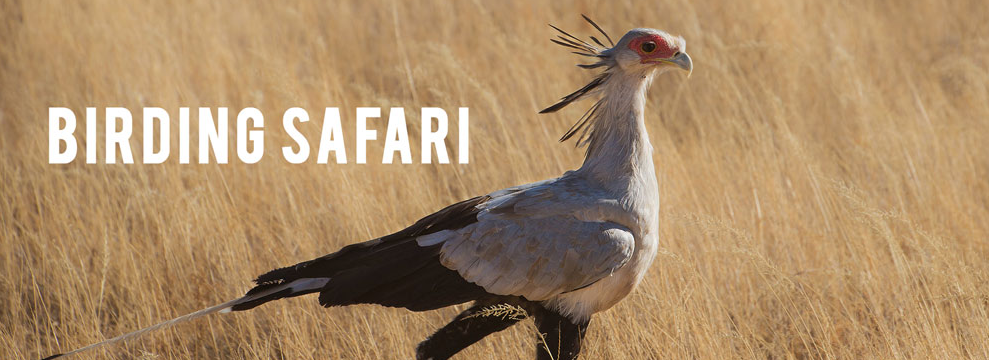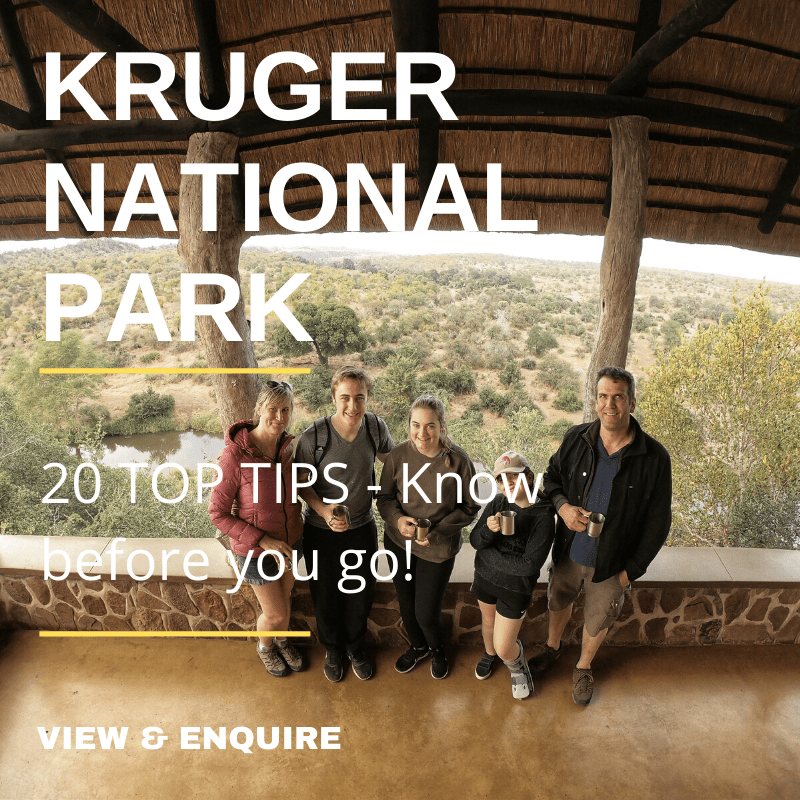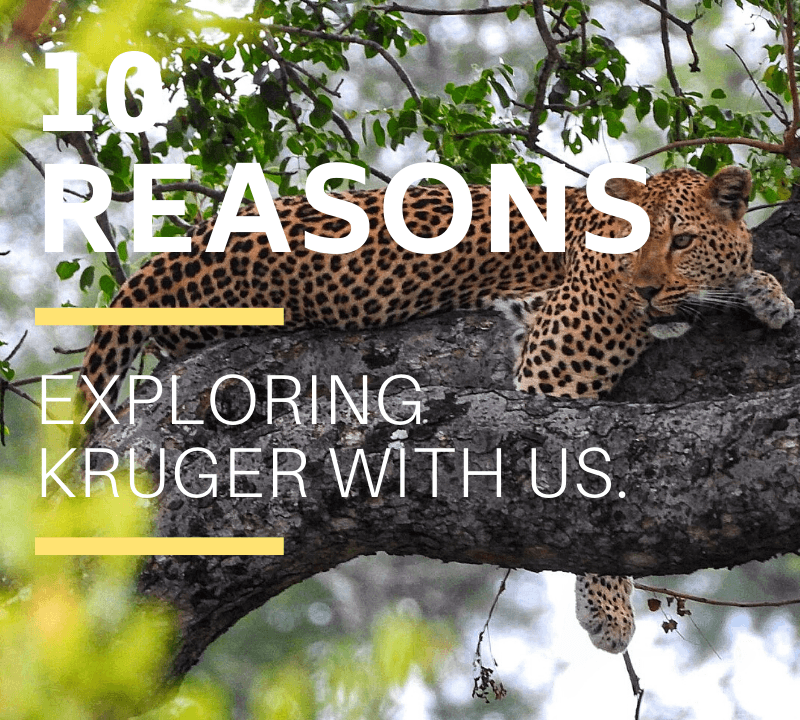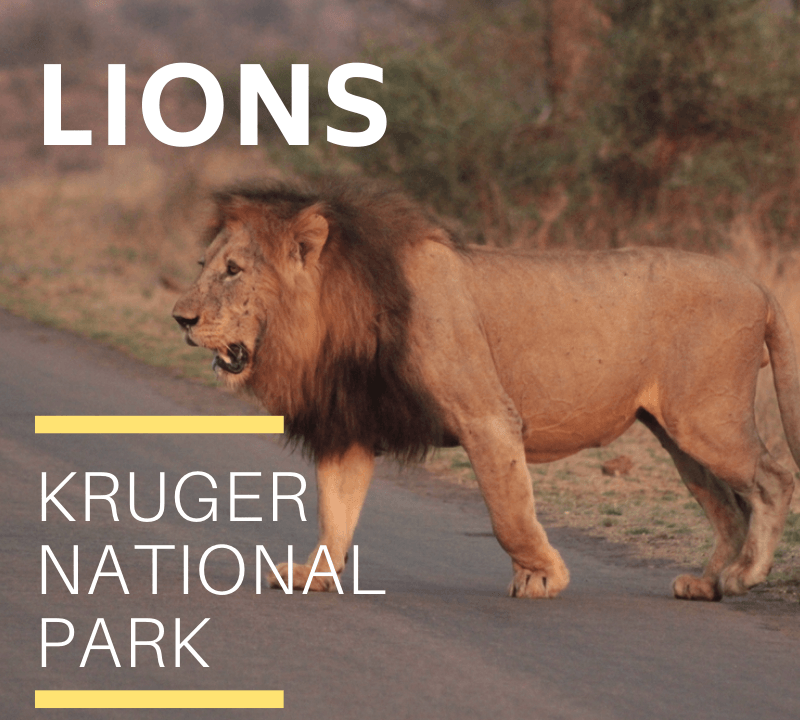
20 Tips when visiting the Kruger National Park
Visiting the Kruger National Park is a very exciting experience. It’s often a life long dream and a serious tick off the bucket list. In preparation for your visit, here are some of the best tips we can offer you to ensure a safe, fun and informed Safari into the Kruger National Park.
These tips are in no specific order and should all be acknowledged and understood in the planning process.
- 1. Time of year is very important. The time of year you choose to visit Kruger will definitely have an effect on your experience. Summers are Hot and often wet, whilst winters are cooler and the days start later and end earlier. In the summer the bush is thick and lush and sightings more challenging whilst winters look dry and drab but sightings, particularly around water, are great. Remember summer months are malaria months and require a prophylaxis. Summer months between October and February are great for birding.
- Kruger is not a Zoo. This is so important to understand up front. In our day and age TV has given us access to incredible wildlife footage that often motivates our desire to travel to Africa with the hope of capturing those amazing moments personally. Whilst the door of opportunity and chance are always open one needs to understand that wildlife documentaries take months and in some cases years to capture the footage. Trying to see the same thing on a 7-day trip to Kruger is highly unlikely. Sorry. This is why it’s so important to have a guide as its stand you the best chance of good sightings and possibly great sightings. Don’t be disappointed though the diversity of life is incredible and the environment is stunning so you will see wonderful sightings and experience beautiful destinations. It’s Kruger as a whole that makes the experience.
- What to Pack for a Kruger Park Safari. The most important rule is make sure it’s comfortable and try keeping it neutral. Part of the fun of going on any trip is the preparation. Getting the right gear for the adventure is part of the whole experience and getting your Safari on is as important as seeing the Big 5. Season is important so pack accordingly. Summers (Sept-Apr) can reach north of 40 Degrees so UV protective clothing is advised. Shirts with sleeves that can roll up are great and pants with zip-off bottoms are also recommended. Both of these items double up for the evenings when you don’t want too much exposure to mosquitos. Even during summer make sure that you have a warm jersey or jacket as temperatures can drop particularly on days with rain. During winter (May-Aug) the temperatures fluctuate between 10 Degrees and 25 Degrees. See more detail on our section on Kruger’s Climate. Here are some of our recommendations.
| Summer Months (Sept-Apr) | Winter Months (May-Aug) |
| Thin UV resistant Long sleeve shirts | UV resistant Long sleeve shirts |
| Zip Off hiking pants | Cargo Pants |
| Sneakers | Sneakers |
| Sandles | Shorts |
| Shorts | Jeans |
| Jeans | Flanel Shirt |
| T-Shirt | Thick Leggings (Ladies) |
| Leggings (Ladies) | Hoodie / Sweatshirt |
| Hoodie / Sweatshirt | Body Warmer |
| Body Warmer | Thermal jacket |
| Waterproof jacket | A good Sun Hat |
| A good Sun Hat | Beanie |
| Beanie | Scarf |
| Swimsuit | Leather Boots |
| Day Pack | Day Pack |

Top Tip: An important tip regarding what to wear is the wear Layers and keep colors neutral. Temperatures fluctuate from early morning to midday and so it’s advised to start every Safari drive with layers particularly on Open Safari Vehicles. Carry a travel pack for your gear so you can shed clothing items, as the days get warmer.
- Kruger has Malaria in the summer months. Being a sub-tropical climate between September and April the Kruger Park falls within a Malaria area. This is not to be taken lightly and visitors are advised to seek medical opinion and take a prophylaxis. We also advise that guest during the summer months keep anti-mosquito roll-on or a mosquito spray handy at all times and spray over clothing and skin early morning and late afternoon and evening. You can find sprays, coils to burn and plug-in diffusers at all the main camps. Buy them and use them. Always better to be over cautious than not. That said if all the above recommendations are adhered to, you should be perfectly fine.
- Entering a Kruger Park Gate. The Kruger Park has 8 main gates to access the Park and the respective camps in the area. Entering the Park for a Day Safari or an extended stay at the camps is a simple process. At the Gate reception you will find an entrance document and indemnity. Fill this in and ensure that you have copies of Passports available. Its worthwhile also knowing specific entrance fee values prior and having this available in cash, as sometimes there is no power at the gate causing entrance delays.
- Here are the Kruger Parks Codes of Good Game Viewing and General Rules.
- Stay in your vehicle at all times unless in a designated area that is clearly marked. No part of your body may protrude from a window or sunroof. Convertibles must remain closed at all times.
- The maximum speed limit is 50km/h on tar roads and 40km/h on dirt roads. Speed checks are done throughout the park. Those that exceed the speed and are caught will be fined.
- Do not drink and drive. General rules of the road apply within the Kruger National Park. Offenders caught under the influence of alcohol will be arrested.
- Have a Valid License. It is an offence to drive on South African roads without a valid drivers license or recognized international drivers license.
- Road Closures. Please note that not all roads are accessible to caravans and due to high rainfall certain roads may be closed. Under no circumstances may you enter these roads.
- Entrance Gate Times. Gate times must be strictly adhered to. Guests should be inside their allocated overnight camp by gate closing time. Day visitors must exit the park before entrance gate closing times. Entrance gates can refuse any late entries and fine late departures.
- Overnight Visitors. Are only allowed to stay at the specifically booked overnight facility/camp and must report to the specific camps reception prior to occupying accommodation.
- Departure Times. All accommodation and camping sites may only be occupied from 14h00pm and must be vacated by 10h00am on day of departure.
- Restricted Driving Areas. Vehicles must remain on the designated roads indicated. Roads with a no-entry sign at entrance are strictly prohibited. Using these roads is regarded as a serious offence.
- Don’t Feed the Animals. The feeding of any of the wildlife is regarded as a serious offence and offenders can be prosecuted.
- Removing of Fauna or Flora is prohibited. No plant or animal or part thereof may be removed from the park without permission.
- Disturbing the Game is prohibited. Touching feeding or disturbing the game in any way is not permitted and regarded as a serious offence.
- Declare weapons at the Gate. Guests are to please ensure that if they have any weapon/firearm that it is legally declared at the gate on entry.
- No killing of Animals. Poaching or killing of animals is strictly prohibited and severely punishable by law.
- Here are some general rules of safety viewing Elephants in the Kruger
Breeding Herds ? Breeding herds of Elephants are potentially dangerous and one must show caution when approaching females with young claves. The matriarch or members of the herd can become aggressive and intolerant of a vehicles presence and if feeling threatened will charge. This is very serious can may result in great and harm to vehicle and individual/s. Keep a safe distance and stay in your car.
How to identify and behave near a Bull Elephant in Musth? Bulls are identified by the constant flowing of strong smelling urine noticeable on the hind legs. When walking on the road they leave a characteristic trail of urine. The temporal gland between the eye and ear will also secrete a dark substance. Musth Bulls experience heightened levels of testosterone and for this reason it is advised to keep a safe following distance and not to appear threatening in anyway.
How not to behave when watching Elephants?
- Do not drive off the road
- Do not follow the Elephants
- Respect the Elephants at all times
- Always allow the Elephants right of way
- Drive off slowly if they are very close
- Do not cut off their path
- Do not rev the engine near elephants
- Here is the list of strictly prohibited activities or actions on the Kruger Park
- Travelling between rest camps before or after the designated access times
- A stringent noise restriction is enforced between 21h30pm and 06h00am
- Visitors should be advised that a load car stereo system causes disturbances to both animals and people. Volume levels to be kept to a minimum.
- The use of roller skates, skateboards, bicycles, motorbikes and quad bikes is prohibited anywhere in the Park
- Every game sighting has rules and the following Good Game Viewing protocols are required.
- Game Sighting – General: For game viewing please park on the side of the road closes to the sighting. Should you need to turn around and change direction please do so. Don’t park facing on coming vehicles. Do not stop in the middle of the road as this is reserved for traffic flow at all times. Be careful when passing animals and birds as they may be alarmed and run into the road.
- Game Sighting – Congestion: In the event of a sighting that has many vehicles, the opposite side of the road to the sighting may not be blocked as this must be used to relieve congestions and allow flow of vehicles to pass. There are traffic monitor vehicles within the park and if you are found to be obstructing traffic you will be fined.
- Bring Binoculars and a Camera. This is critical as there is so much to see and capture. Many sightings may be well of the road and you will need a helping hand so don’t forget your binoculars. Most important of you are a birder. Binoculars are available in the Parks shops at the 12 main camps around the Park. Camera equipment is essential although most modern smart phones do offer great functionality.
- Bring Travel Adapters. Coming back to personal equipment it’s advised that all devoices that required charging you must have the relevant adapter. All accommodation has access to electricity so you can re-charge batteries and phones. Standard South Africa plugs are 3 Circular prong plug adaptions.
- Sunscreen even in winter. Being out on an Open Safari vehicle means that you are going to be exposed to the sun and even in winter with midday temperature of 25 you will get burnt. There is nothing worse than lying in bed at night unable able to move because you got a bad sunburn.
- Be prepared to get hot and sweaty. The only way to have great sightings is to explore and spend as much time in the savanna as possible. This point is in conjunction with wearing the right clothing and also wearing sunscreen. Getting hot and sweaty is a fact of life on safari and you can expect to experience both.
- Mornings Start Early. Getting out early is part of being on Safari. As they say the early bird get the worm and this could never be truer. Early mornings increase the opportunity of seeing the last of the nocturnal creatures and also provides more game viewing time before the onset of the midday heat. Get up and go, you wont regret it. Open Safari vehicles are fitted with blankets so you will still be snug and warm if the sun has peered over the horizon yet.
- Mobile Phone Reception. If you decide to roam on your existing mobile service of purchase a pre-paid number whilst in South Africa its important to note that signal in the Kruger National Park is patchy. We would advise going with MTN, as they seem to have the best coverage.
- 16. Medical Emergencies. Every camp has a safety officer that is trained in basic first aid and CPR. Skukuza Camp has a permanent Doctor and should you need to make an appointment this can be done from any of the main camp receptions. There is a 24hour phone line (013) 735-5638. In real emergencies the park has access to ambulances as well as helicopters to transport patients to hospital. Make sure that you have all your required medication with you. If you need a ventilator bring extras and keep in overnight pack and daypack. If you are allergic to Bees make sure that you travel with the necessary medication required. All guides are required to have at minimum Level 1 First Aid to ensure guest safety.
- Vehicle Breakdown Service. Everyone’s worst nightmare is getting a puncture whilst out on Safari. Don’t panic there is an Emergency Road Services number that can be dialed 0800-030-066. In the event that you are unable to get reception you can either flag down a passing vehicle or specifically wait for an Open Safari Vehicle to pass. They have access to the Joint Operations Centre and can help you get assistance.
- What are the Kruger Parks Gate Times?
| JAN | FEB | MAR | APR | MAY | JUN |
| Camp Gates Open : | |||||
| 4:30 | 5:30 | 5:30 | 6:00 | 6:00 | 6:00 |
| Entry Gates Open | |||||
| 5:30 | 5:30 | 5:30 | 6:00 | 6:00 | 6:00 |
| Entry Gates Close | |||||
| 18:30 | 18:30 | 18:00 | 18:00 | 17:30 | 17:30 |
| JUL | AUG | SEP | OCT | NOV | DEC |
| Camp Gates Open : | |||||
| 06h00 | 6:00 | 6:00 | 5:30 | 4:30 | 4:30 |
| Entry Gates Open | |||||
| 6:00 | 6:00 | 6:00 | 5:30 | 5:30 | 5:30 |
| Entry Gates Close | |||||
| 17:30 | 18:00 | 18:00 | 18:00 | 18:30 | 18:30 |
- Ask your Guide Questions. Don’t Be Shy. This is very important, not only will you get more out of your experience but also Guides enjoy sharing as much information as possible. The more enthusiastic you are the more enthusiastic your guide will be to share with you.
- Guide Tips & Gratuities are Encouraged. Having a private Guide is firstly the best way to see the Kruger Park but it also makes for a more memorable experience. Your day Safaris will start from 05h30m and end at 16h00pm. Your guides on the other hand will be up from 03h30am and will only finish their days sometimes around 19h00pm. So we recommend showing your appreciation. You can budget on R150pp per Safari. Trust is your guide will really appreciate your gratuity.






1 Comment
Thanks very interesting blog!